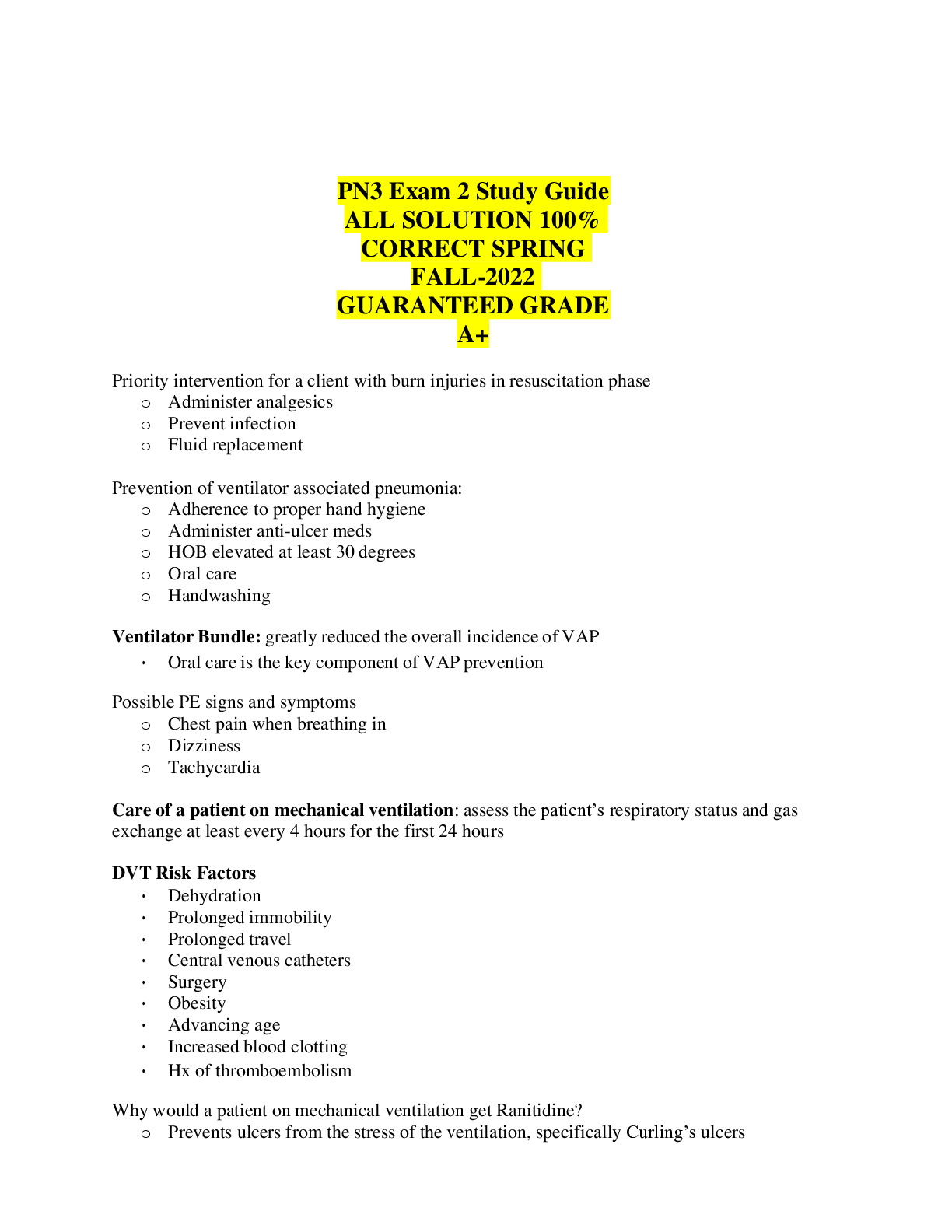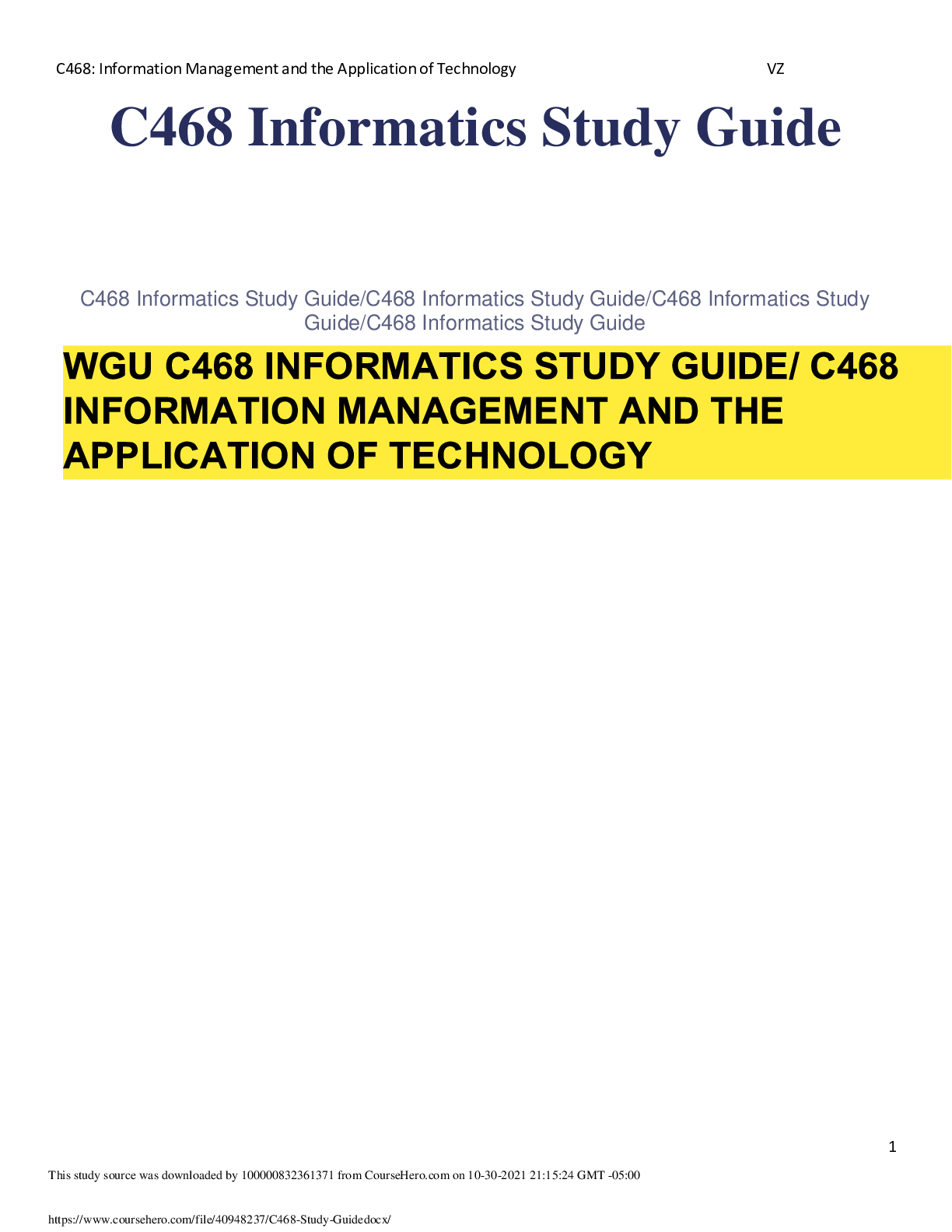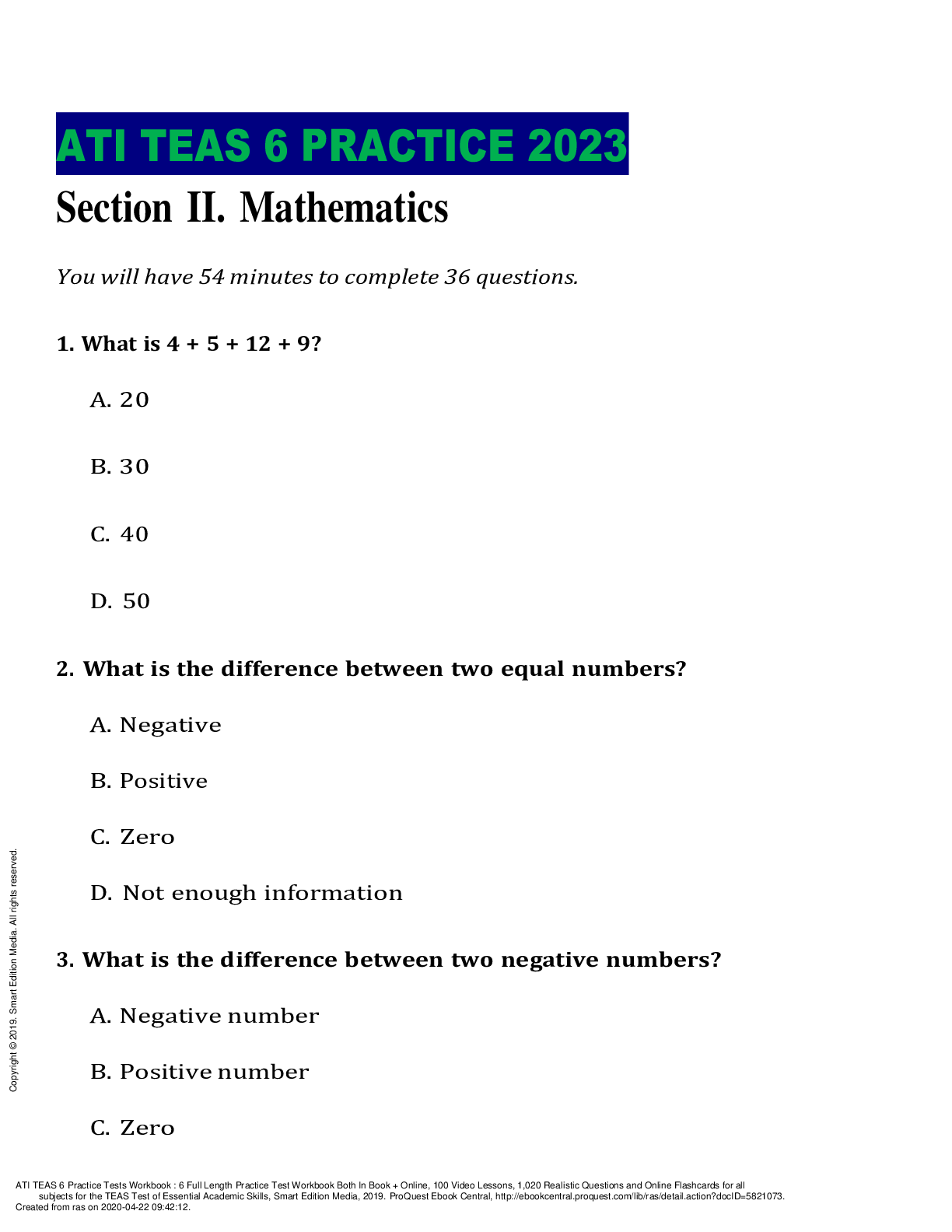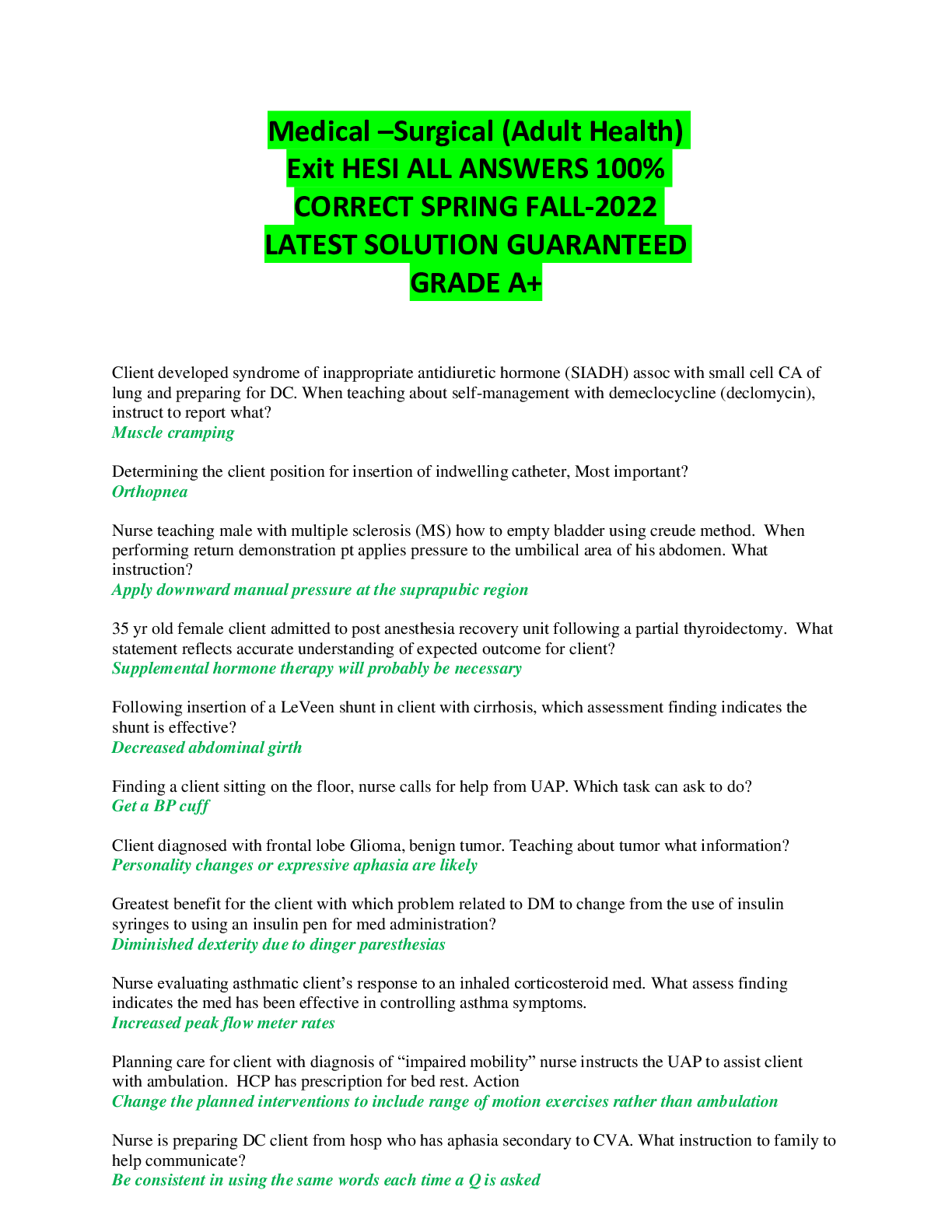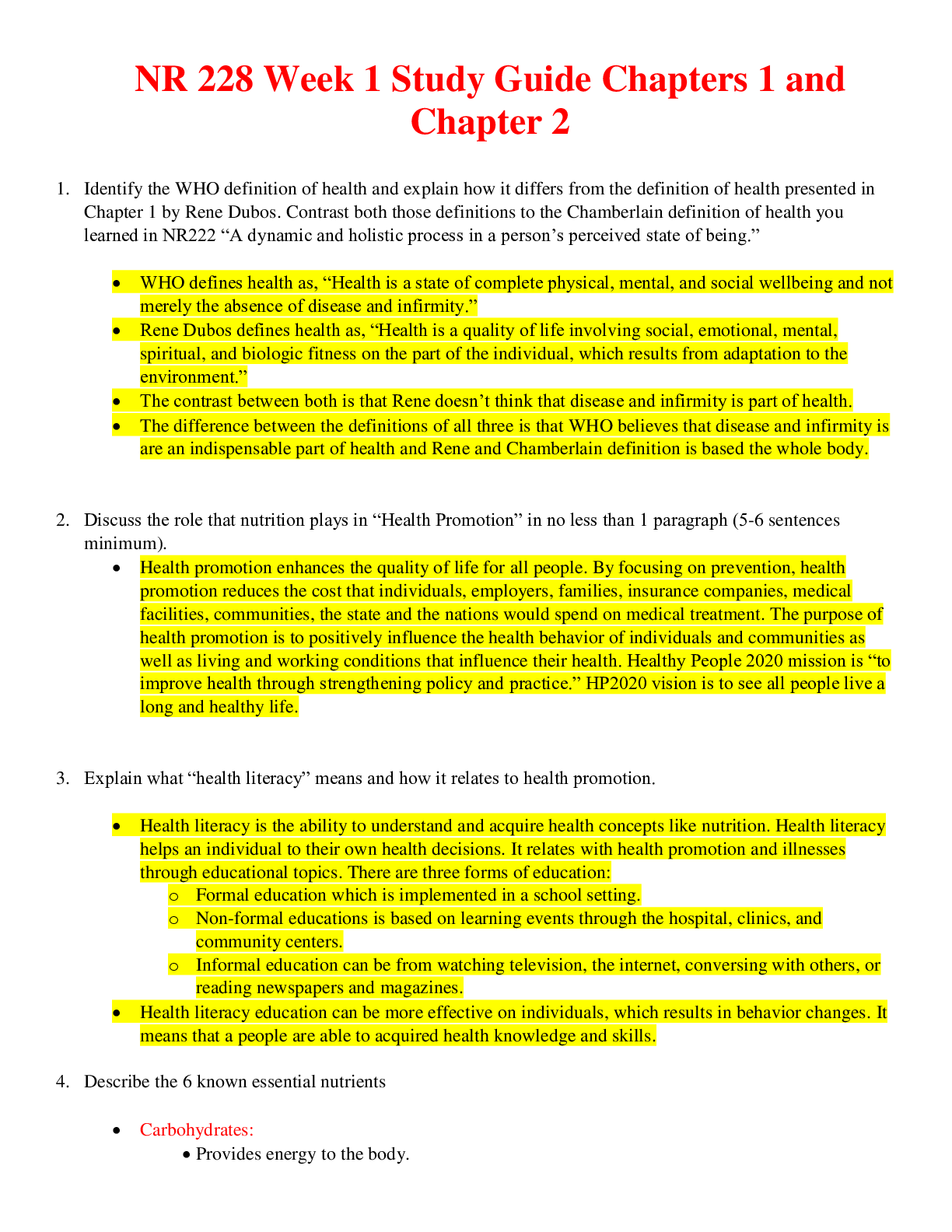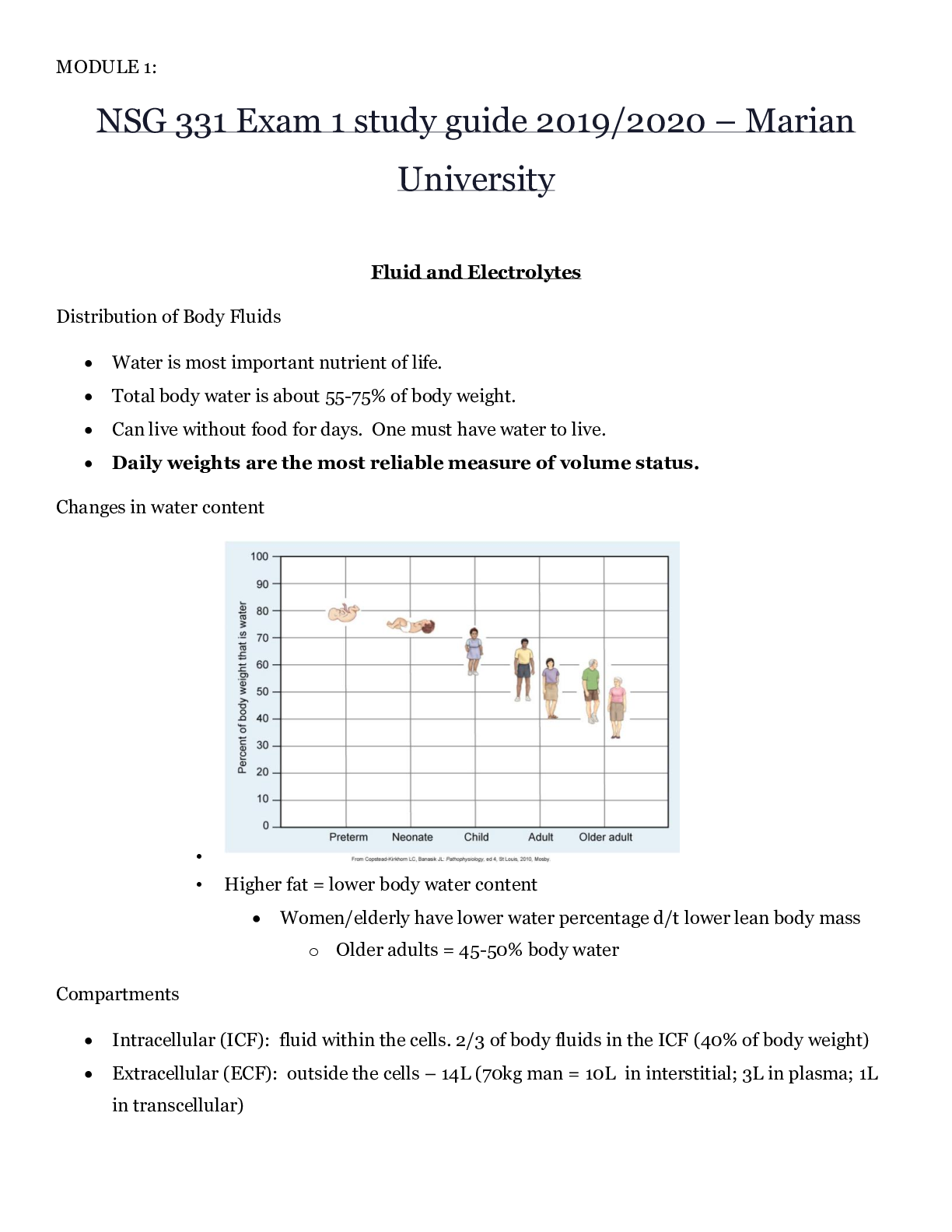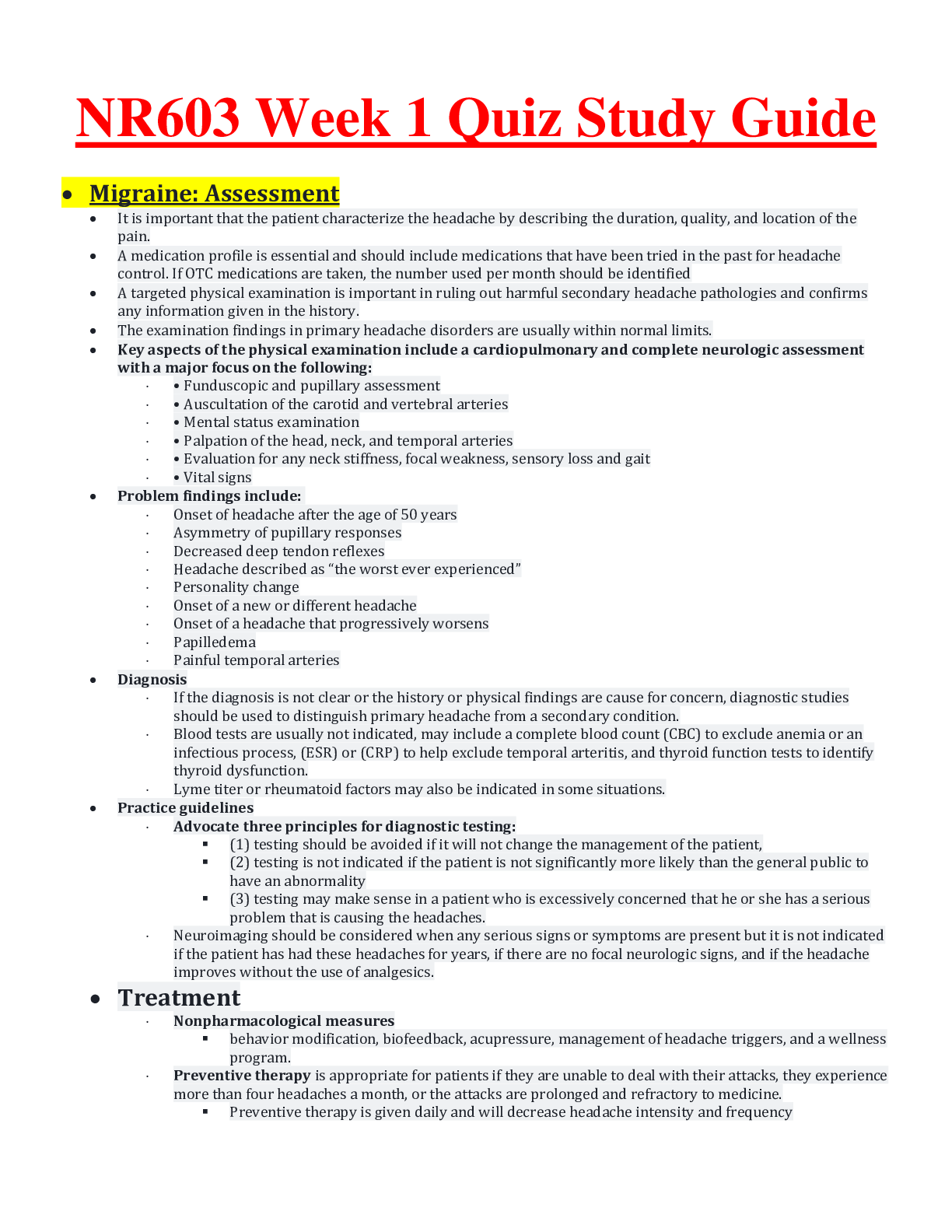*NURSING > STUDY GUIDE > PHARMACOLOGY EXAM 1 STUDY GUIDE ALL ANSWERS 100% CORRECT FALL-2021 SOLUTION AID GRADE A+ (All)
PHARMACOLOGY EXAM 1 STUDY GUIDE ALL ANSWERS 100% CORRECT FALL-2021 SOLUTION AID GRADE A+
Document Content and Description Below
• Drugs that PRODUCE a response? o Agonist • Drugs that PREVENT a response? o Antagonist • Therapeutic WINDOW is what? o Level of the drug between minimal effective concentration in the... plasma for obtaining desired drug response and the minimal toxic concentration • The time it takes for ½ of the drug concentration to be eliminated from the body is called? o Half life • What is a patient on two highly protein bound drugs at risk for o Accumulation and toxicity o A decreased responsiveness over the course of therapy which may lead to the need to increase dosages to attain the same effect tolerance • What is it called for drugs to share many common features o Classification or class • What makes drugs fit into the same “class” o Related by chemical structure o Work in the same way o Used for the same purpose • Another name for antagonist? o Adrenergic blocker • Who do you not give antagonist or adrenergic blocker to? o Asthma client • Beta blockers commonly seen in what clients? o Hypertension • Antagonist suffix o LOL • Antagonist S/S o Decreased HR o Rest and digest o Bronchospasm • Agonist S/S o Increased HR, Fight or flight, Vasoconstriction, Increase blood sugar • Before administering antagonist what do you check o HR and BP • Cholinergic o Salivate, Lacrimation, Urinate, Defecate, Decreased weight • Anticholinergic o Can’t see, pee, spit, poop, and increase HR • What type of drug is Reglan? o Cholinergic • How do you treat cholinergic crisis o Atropine • Cholinergic crisis S/S o Flushing, sweating, nausea, ab cramping • Anticholinergic drugs are contraindicated in who? o Coronary artery disease (increase HR) o GI obstruction (constipation) o Supraventricular tachycardia (increase HR) • CNS stimulant drugs are contraindicated in who? o Coronary artery disease (cause vasoconstriction=heart attack) o Hypertension (additive hypertension=stroke) • Hemorrhagic stroke o Increase BP o Increase HR o Increased RR o Unresponsive to deep pain • Anorexiants can lead to what? o 16x greater risk for stroke • Most common side effects of Ritalin o Irritability o Insomnia ▪ Weight loss ▪ Decrease appetite • Benzodiazepines increase activity to what neurotransmitter (PAM & LAM) o GABA • Reversal to benzodiazepines o Flumazenil • Ambien side effects o Sedative/hypnotic o Suicidal ideation o Dependence o Abnormal behavior • Drug choice for treating status epilepticus o Diazepam’s • Dilantin can do what? o Cause gum disease o Treat seizures o Cause high BP o Cause birth defects o Decrease effectiveness of anticoagulants • When a client is on Dilantin what are some nursing interventions? o Monitor for narrow therapeutic index (freq blood test) o Take as prescribed o Oral care o Teach pt to use barrier contraceptives along with oral • What is therapeutic level for Depakote? o 40-100 • If Depakote levels are high (>100) what needs to be done? o Hold meds o Check liver function with blood test o Discuss with DR o Neuro assessment o Check vitals • What does Depakote treat? o Epilepsy o Migraine • Bipolar disorder • Benzodiazepines can lead to what? o Tolerance o Dependence o Withdrawal • Barbiturates reversal treatment o Activated charcoal • Example of barbiturates o Phenobarbital • What disease process goes with “dopamine depletion”, rigidity, acetylcholine accumulation, acetylocholinerase inhibitor drugs, facial masking, motor neuron degeneration and anticholinergic drugs o Parkinson’s disease • What disease goes with confusion, bradykinesia, memory loss, amyloid plaques, and neurofibrillary tangles o Alzheimer’s disease • Aricept improves what? o Cholinergic function • What is SLUD o Salivation, lacrimation, urination, defecation • You CANNOT crush CONTIN, POTASSIUM and IRON o You CAN crush calcium antacids • What disease process goes with “lack of Ach receptor sites”? o Myasthenia Gravis • What disease process goes with “respirator muscle weakness”? o Myasthenia gravis • What disease process goes with “anticholinesterase inhibitor drugs”? o Myasthenia gravis • What should you avoid while taking cyclobenzaprine (flexeral)? o Driving and alcohol • A patient is taking an MAOI and eating blue cheese and red wine with dinner, what should you tell them that they are at risk for? o Hypertensive crisis • A patient is taking Lithium, you should advise them to avoid what other drugs? o Ibuprofen, ACE inhibitor, HCTZ • Serotonin syndrome S/S o Agitation, confusion, rigidity, fever • Extrapyramidal (EPS) effects are most common with which class of antidepressants? o Tricyclics • What to keep in mind with lithium? o It has a narrow therapeutic range, do not crush, check serum levels, take same time every day, and lab range is .4-.8 MeQ/L • What drugs contain acetaminophen? o Vicodin, Tylenol, Lortab, Norco, Excedrin, Nyquil, fioricet, Percocet, alka seltzer plus • What drugs do not contain acetaminophen? o Tramadol, gabapentin, flexeril, ketorolac, Motrin, dilaudid, Advil • What drug should not be given during an acute gout flare up? o Probenecid • What is an injectable NSAID? o Toradol • Ibuprofen should always be taken with? o Food or milk • All opioids can be reversed by what? o Narcan/naloxone • Max daily dose of acetaminophen for adults? o 3 grams/2 grams for elderly or liver/kidney damage • Common side effect of opioids are? o Respiratory depression, hypotension, increase intracranial pressure • Extra pyramidal symptoms? o Tardive dyskinesia, akathisia, acute dystonia • Neuroleptic malignant syndrome? o Sudden high fever, tachycardia, BP fluctuations, altered mental status, acute renal failure • The ONLY non-sedating anti-anxiety med is? o Buspar • Typical antipsychotics may be prescribed for short term use why? o It is faster working • Extra pyramidal side effects are most commonly seen in which class of medications? o Typical antipsychotics • How do you know if a neuroleptic is working? o Positive change in behavior • What do you need to teach with DMARDS? o Good hygiene • What is pharmaceutics? o Applies only to tablets or capsules given by mouth (PO). The process in which the tablet or capsule becomes a solution so that it can cross the biologic membrane of the stomach or small intestine [Show More]
Last updated: 2 years ago
Preview 1 out of 22 pages

Buy this document to get the full access instantly
Instant Download Access after purchase
Buy NowInstant download
We Accept:

Reviews( 0 )
$12.00
Can't find what you want? Try our AI powered Search
Document information
Connected school, study & course
About the document
Uploaded On
Dec 16, 2021
Number of pages
22
Written in
Additional information
This document has been written for:
Uploaded
Dec 16, 2021
Downloads
0
Views
126

